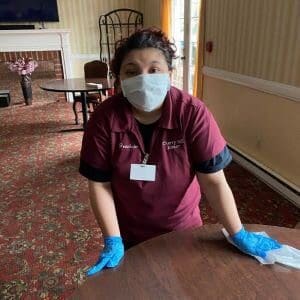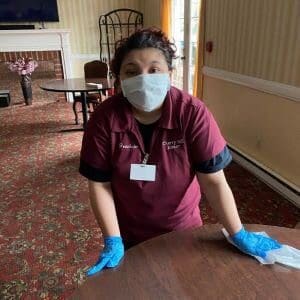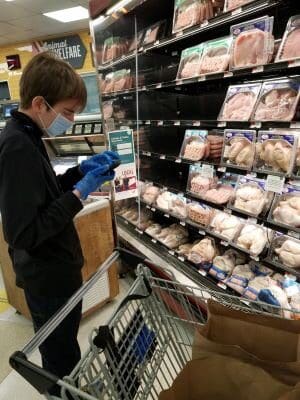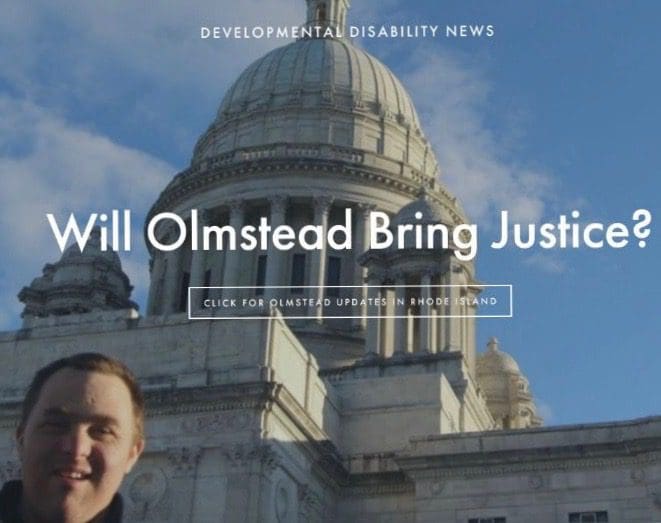Search Posts
Recent Posts
- Detailing Manhattan: Christopher Gray’s Legacy – David Brussat April 26, 2024
- Business Beat: BankNewport supports Kids’ Zone at new Save The Bay Hamilton Family Aquarium April 26, 2024
- Rhode Island Weather for April 26, 2024 – John Donnelly April 26, 2024
- GriefSPEAK: Dread. Fear. Welcome relief. – Mari Nardolillo Dias April 26, 2024
- Outdoors in RI: big animals, tiny Ticks, huge Trout, Chepachet’s Harmony Railway, 2A – Jeff Gross April 26, 2024
Categories
Subscribe!
Thanks for subscribing! Please check your email for further instructions.

RI: Life and Death in Split-Screen Reality
By Gina Macris
The statistics are grim: five deaths since April 1 attributed to COVID-19 in connection with group homes in Rhode Island, including four residents with developmental disabilities and one caregiver.
But stories from the developmental disability community are not all about vulnerability.
Some people with intellectual challenges are nevertheless working on the front lines to help get food on people’s tables and keep congregate care facilities clean. Nikolas Simijis, for example, has made a conscious decision to work as a personal grocery shopper in Providence, despite the risks.

Cassiana Fuller recently took on a job in the housekeeping department at the Cherry Hill Manor And Rehabilitation Center in Johnston, undergoing special training in cleaning high-contact surfaces last month just as the coronavirus started to hit Rhode Island. And a third worker, identified only as Michael, hasn’t missed a day on the job at Shaw’s supermarket in East Providence since he was hired last August.
Like the rest of the country, Rhode Island is living a split-screen reality, literally and figuratively. At the same time that Governor Gina Raimondo was giving one of her daily briefings this past week on illness, hospitalization, and death from a largely empty reception room at the State House, Nikolas Simijis, Cassiana Fuller, and Michael stood by at their separate workplaces, preparing for their own press conference on Zoom, the teleconferencing app.
The virtual event was sponsored by the Rhode Island chapter of the Association of People Supporting Employment First (RIAPSE) and the Rhode Island Developmental Disabilities Council “to show how people are affected by policies and legislation,” said Kevin Nerney, executive director of the Council.
The federal-state Medicaid program, which pays for employment-related supports that make it possible for Nikolas, Cassiana, and Michael to work, is “so much more” than medical funding, Nerney said.
“It allows people to live independent and meaningful lives and to be full citizens in their community,” Nerney said. (Medicaid also has waived some of its rules to give states greater flexibility in responding to the pandemic.)
The annual event, called “Take Your Legislator To Work Day,” drew U.S. Rep. David Cicilline, representatives of the other three members of Rhode Island’s Congressional delegation, who had to bow out to attend pandemic-related events, and several members of the Rhode Island General Assembly.
Adrienne Tipple of the Perspectives Corporation, who helps Nikolas at Whole Foods on Waterman Street in Providence, said the two of them had serious conversations about “what’s going on in the world, and he made an informed decision to be out here.”

Whole Foods provides a mask and gloves for Nikolas, who has his temperature taken every day when he gets to work, Tipple said. She is Manager of Youth Transitional Employment Services at Perspectives.
Nikolas uses an iPhone loaded with the software he needs to navigate the store to shop items on customers’ lists, bag them, and hand them off to a driver for delivery.
“Some people can’t come to the store. It would be a risk for them,” Cicilline said. “The work you are doing will help save people’s lives. Thank you for doing it,” he said.
Other legislators – State Reps. Joseph N. McNamara, D- Warwick; Terri Cortvriend, D-Portsmouth; and Katherine S. Kazarian, D-East Providence, as well as State Sen. Louis Di-Palma, D-Middletown, underscored that message.
At the Cherry Hill Nursing Home and Rehabilitation Center in Johnston, Cassiana’s supervisor, Kevin Carrier, praised her diligence and attention to detail, particularly the cleaning of high-contact surfaces like doorknobs and elevator buttons.
Cassiana, Nikolas and Michael all are young and healthy and live with their families. They don’t have any underlying medical conditions which might make other people with developmental disabilities more vulnerable to the virus, especially in congregate care settings.
With the peak in coronavirus cases still a week to ten days away in Rhode Island, according to the experts’ projections, the impact has started to hit the developmental disabilities community.
As of April 18, there have been 35 cases of COVID-19 in group homes for adults with developmental disabilities, while an additional 6 residents of group homes for behavioral health have tested positive. Seventeen group home residents have been hospitalized, according to a spokesman for the state Department of Behavioral Healthcare, Developmental Disabilities and Hospitals (BHDDH).
Two of the four deaths of group home residents occurred at different properties run by AccessPoint RI. BHDDH has been working with AccessPoint “throughout the crisis” to contain the virus, identifying relief staff, supplying AccessPoint’s emergency facility with beds and supplies and moving some residents to an alternate BHDDH group home, the spokesman said.
A total of 1180 people with developmental disabilities live in congregate care, but that is less than a third of the population receiving some type of service from BHDDH. The department is asking everyone with developmental disabilities and their family members to check in if anyone in the household has tested positive. Details on the check-in, as well as information on other types of outreach, are in the department’s weekly developmental disability newsletter, which can be found by clicking here. The newsletter includes a correction from last week’s installment, saying that those who independently direct services for a loved one may hire a family member as a caregiver.
A widespread shortage of masks, gloves and other equipment in hospitals, nursing homes and other congregate care settings has been one of the issues Governor Raimondo has addressed repeatedly in her daily briefings as Rhode Island competes with other states and with the federal government to get the equipment it needs.
Unionized workers at the ARC of Blackstone Valley protested against a lack of protective equipment and inadequate pay with a caravan of cars outside the ARC of Blackstone Valley at, 500 Prospect St. in Pawtucket April 15.
The rate increase authorized by the state to private providers of developmental disability services pays for a $1 an hour raise, but providers, who have been hit hard fina

Gina Macris is a career journalist with 43 years’ experience as a reporter for the Providence Journal in Providence, RI. She retired in 2012. During her time at the newspaper, she wrote two series about her first-born son, Michael M. Smith. Both series won prizes from the New England Associated Press News Executives Association. Michael, now in his 30s, appears on the cover page, in front of the Rhode Island State House.

